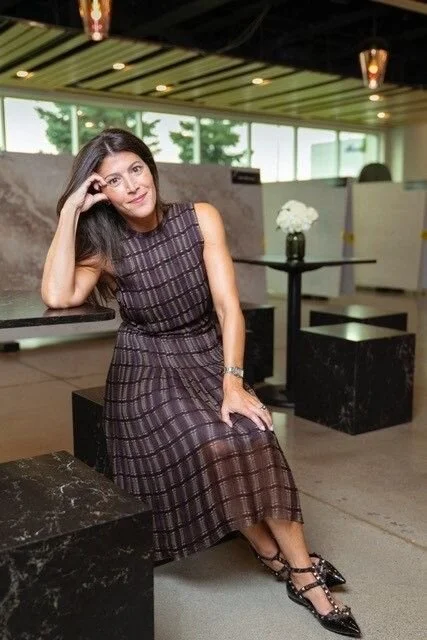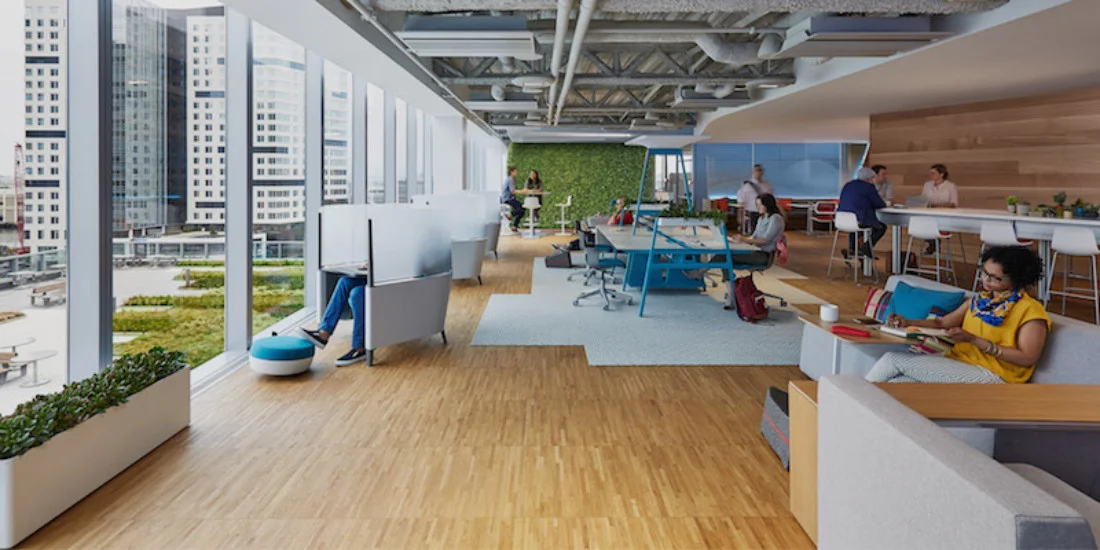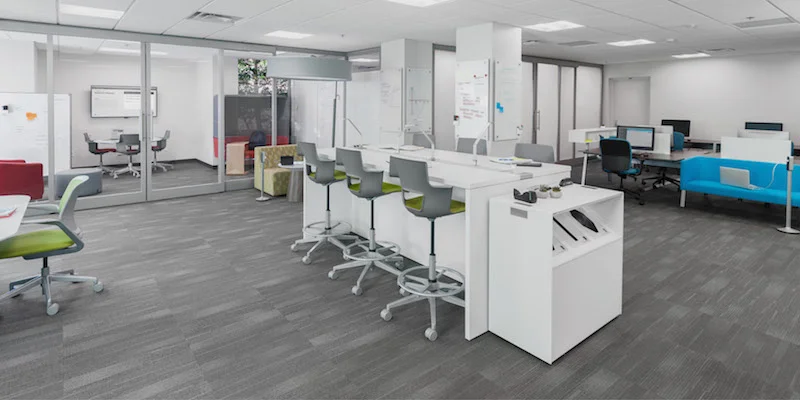Most of us—okay, none of us—will ever get to live like Silicon Valley designer Yves Béhar. But thanks to the coworking space Canopy, some people might make their office lives a bit more Béhar-ian. Set to open this fall in San Francisco's tony Pacific Heights neighborhood, Canopy is the brainchild of Béhar and his friend, architect, and developer Amir Mortazavi. Like other boutique coworking spaces, expect a mix of shared and private spaces, an in-house cafe, bookable conference rooms, phone booths for calls, and swanky design.
Co-Working Space Growing, But Still Small Part Of NYC Market
NEW YORK CITY—The growth of co-working space in New York City has been phenomenal, scoring a 767% increase in occupied square footage since 2009 and an 86% higher number of co-working locations during that time.
However, despite the heady numbers, co-working remains a small niche in the overall Manhattan office market, registering a 1.2% market share at the moment. Newmark Grubb Knight Frank has released a report entitled: “WeLease: The Growth of Shared Workspace and Its Impact on the New York City Market” that provides concrete data on the relatively new phenomenon of co-working and how it has changed the way people work and how companies grow here and across the country.
WeWork Quietly Opens Hotel Rooms In New York City
When the rent-a-desk giant WeWork opened a flexible housing spin-off, WeLive, this January, it advertised pay-by-the-month furnished rentals for transient millennials. The apartment complex in the financial district of Manhattan comes complete with an arcade inside of the laundry area and an app for organizing community events. That same building has now added another option to its menu: hotel rooms.
Inside A Growing Movement Of Coworking Spaces For Atypical Entrepreneurs
Long Beach, California-based WE Labs just opened its second coworking space in the historic Packard Building, a Spanish Baroque-styled car showroom from the 1920s. Behind it is an empty lot, next door is an auto body shop, down the street are swanky new apartments, and a block away is the light rail. It looks like a textbook gentrification setting, but WE Labs's clients differ from what you'd expect at mainstream, big-city coworking spaces like those in the WeWork empire. They include a bookkeeper, a mental health services nonprofit, painters, and a roller derby-themed fashion designer. Monday to Saturday, 9 a.m. - 6p.m. access is $175 per month—on the low side for coworking space in the L.A. area.
INTERVIEW: Mike Wagner, President of Kimball Office on the partnership with ShareDesk
This conversation highlighted some of Mike’s views of the major shifts in the commercial real estate and office furniture industry, Kimball Office’s strategy in adapting to these shifts, and what to expect from the Kimball/ShareDesk partnership.
Is the Staples/Workbar partnership the answer to retail's real estate glut?
Between the rise of e-commerce and the U.S. population's demographic shift to urban centers, the era of thriving big box retail is largely over. Along with evidence that U.S. retail is overstored, many merchants are left scratching their heads about what to do with excess space. Staples has one answer. The office supplies retailer recently announced that it would partner with office-space sharing startup Workbar to set up co-working spaces in three suburban Boston area stores.
Startup adds an interior design spin to N.Y.C. co-working
The proliferation of co-working spaces in New York — WeWork, WorkVille, NeueHouse and even Barclays Capital— are usually nondiscriminatory when it comes to the startups they welcome. Very few, if any, are tailored for a particular niche or industry.
However, one New York-based startup is offering something different. Fuigo, co-founded by a team of textile manufacturers and backed with $4 million in venture capital, opened its doors to local interior designers last week. The goal, according to co-founder Maury Riad, is to level the playing field by providing designers with all of the necessary resources that would otherwise only have been available at much larger firms.
Niche Workspaces: 3 Coworking Spaces That Cater to Freelancers
When you think coworking, you probably picture a bunch of techie Millennials hacking away at a new app or website. That stereotype exists for a reason: coworking has long since been dominated by the youthful tech industry, and it feeds off of small startups that want to work in proximity with their like-minded entrepreneur peers. But as coworking has grown, it has also broadened its target audience. Right now, in the U.S., there are countless coworking spaces that are dedicated to specific industries, from beauty to art, to fashion and baking. If you’re a freelancer who spends a lot of time at the desk (whether you’re writing or coding), there are coworking spaces out there meant specifically for you.
WEWORK STRUGGLING TO KEEP SPACE FILLED IN LOWER MANHATTAN?
WeWork’s sweeteners for new members include half-off rent for the first three months at its locations at 25 Broadway, 85 Broad St, 200 Broadway and 110 Wall St (the location that's home to Bisnow's HQ). That’s on top of recent incentives like free moves into bigger spaces and 25%-off deals for the first six months, The Real Deal reports. There’s no indication how long these deals will be in effect, but these sorts of deals tend to go along with a push to keep occupancy from slipping.
Work Work Work Work Work: Inside 14 of Brooklyn’s Top Coworking Spaces
Thankfully, Brooklyn is filled with motivated creative people who have done their best to fix this system. In the past five years, coworking spaces here have taken off. Most are small, personality-filled places whose aim is to support the tailored needs of creative professional (architects, writers, designers, filmmakers, social entrepreneurs) and, in order to do that, one word among their owners kept cropping up: Comfort. People work better when they feel better, they all say. They’re not simply talking about standing desk- or ergonomic-chair comfort, they’re talking living room comforts, with couches and rugs and additional creature comforts like full kitchens that come with bottomless coffee, tea, and shared snacks. These places also offer flexibility—many are open 24 hours a day—and with both private and open pockets (phone booths on one hand, and big open spaces on the other), cross-creative collaborations emerge naturally. And, let’s not forget Vitamin D! Lots of these coworking centers have peaceful outdoor refuges attached, like roof gardens and patios out back, so you may remember you are a person on Earth, not a soul-less office drone.
Hotel Lobbies – the preferred workplace
There is little new about working in hotels, says Alex Gifford, Brand & Communications Manager from Allermuir. For a long time they have had meeting rooms and conference facilities, while lobbies have always been used for meeting clients or colleagues.
How to Invest in Co-Working Spaces
As the shared economy continues to evolve companies – both big and small – are managing their expense lines and testing new urban markets with co-working spaces.
In the past, many co-working companies were targeted toward freelancers and startups. According to the CBRE Group's 2015/2016 Americas Occupier Survey of 226 Americas-based corporate real estate organizations, more than 40 percent of respondents are using or considering shared workplaces.
5 Shared-Interest Communities Disrupting the Coworking World
Coworking spaces, incubators and accelerators continue to sprout up in record numbers across the U.S., shifting the conversation about where and how work happens. And while entrepreneurs flock in droves, they’re increasingly motivated by much more than gorgeous facilities packed with perks like free coffee and organic snacks. They’re desperate to learn from others in their industry and are looking for game-changing connections—so they’re shacking up with the competition to get the help they need.
Review: ushering in a new era for the coworking phenomenon
Ramon Suarez has produced a very practical book, based on his own experience as one of the pioneers of coworking. And let’s be clear – it is coworking (not “co-working”; there is no hyphen), as Suarez explains, “a coworker (a member of a coworking space) is not the same as a co-worker (somebody who happens to work for the same company or in your same office)”. On his business card, Suarez describes his role as “Serendipity Accelerator”- you will understand that if you read the book. Suarez differentiates coworking from its many (and mostly false) aliases. Shared offices may be collaborative, but do not provide the network of people found in a good coworking space. Networked offices, where more than one company shares space and may collaborate, “come close” to coworking. Hacker & Maker spaces, Accelerators, Incubators and Cafes are similarly differentiated.
4 powerful benefits of coworking for startups
Coworking spaces are much more than a space for you to work. After all, if all you want is space, you can work from home, go to your local coffee shop or park at the nearest public library. Coworking spaces are different. They aren’t just alternatives to high-priced office spaces. Many foster a community of support and other amenities such as coffee, a kitchen and conference space — not to mention the networking and serendipitous collisions that happen in the hallways.
Why Congress Should Co-Work
I’ve worked in both a Capitol Hill cubicle, as well as an open co-working space at a startup and I can tell you both Congress and the tech community can learn a thing or two from each other. Taking a page from innovative industries can radically transform the way elected officials represent their constituencies and change the way policy gets made. By physically bringing staffers together we could break down the partisan barriers that often keep staffs from communicating across the aisle, all while simultaneously creating a more representative constituent experience.
Traditional office or flexible workspace?
Working in flexible spaces and varied environments is on the rise in the UK, but traditional offices may remain the choice of firms where teamwork is less important.
Why Coworking
With more than 10,000 coworking spaces around the globe, there is no denying the movement is here to stay and that it continues to redefine the way we work. Want to learn more about what it takes to create a great coworking space and the benefits of working in one? We're excited to share our new video and invite you to pass it on and use it freely as our gift —just don't edit or remove our generous contributors.
Is the co-working boom creating the next real estate bubble?
Stratospheric growth in coworking facilities has spawned copycats across the city—and possibly the next big real estate bubble. Manhattan has a record 5.3 million square feet of shared office space, according to real estate services firm Cushman & Wakefield; and Brooklyn has about 1 million square feet, with another 400,000 feet to come in the near future, according to a report from New York University’s Rudin Center for Transportation. There are 53 co-working brands in Brooklyn alone, according to an industry report, and at least 70 in Manhattan.
The Innovative Coworking Spaces of 15th-Century Italy
Coworking spaces are on the rise, from Google’s “Campus” in London to NextSpace in California. Much has been made of these shared workspaces as a brand-new idea, one that barely existed 10 years ago. But the way they function reminds me of a very old idea: the Renaissance “bottega” (workshop) of 15th-century Florence, in which master artists were committed to teaching new artists, talents were nurtured, new techniques were at work, and new artistic forms came to light with artists competing among themselves but also working together.

























